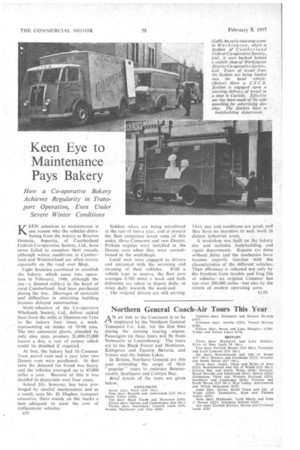Keen Eye to Maintenance Pays Bakery
Page 58

If you've noticed an error in this article please click here to report it so we can fix it.
How a Co-operative Bakery• Achieves Regularity in Transport Operation, Even Under Severe Winter Conditions KEEN attention to maintenance is one reason why the vehicles distributing from the bakery at Brayton Domain, Aspatria, of Cumberland Federal Co-operative Society, Ltd., have never failed to complete theirrounds, although winter conditions in Cumberland and Westmorland are often severe, especially on the road over Shap.
Eight Societies combined to establish the bakery, which came into operation in February, 194g, although the site—a disused colliery in the heart of rural Cumberland—had been purchased during the war. Shortages of materials and difficulties in obtaining building licences delayed construction.
Multi-wheelers of the Co-operative Wholesale Society, Ltd., deliver sacked flour from the mills at Dunston-on-Tyne to the bakery four times a week, representing an intake of 70-90 tons. The two automatic plants, attended by only nine men, produce 20,000-25,000 loaves a day, a rate of output which could be doubled if required.
At first, the bakery had 10 Commer 3-ton petrol vans anti a year later two Dennis vans were purchased. At that time the demand. for bread was heavy and the vehicles averaged up to 45,000 miles a year. Because of this it was decided to depreciate over four years.
Actual life, however, has been prolonged by careful maintenance and as a result, says Mr. D. Hughes, transport executive, there stands on the books a sum adequate to meet the cost of replacement vehicles: Seddon oilers are being introduced at the rate of two a year, and at present the fleet comprises seven vans of this make,three Commers and two Dennis. Perkins engines were installed in the Dennis vans when they were reconditioned in the workshops.
Local men were engaged as drivers and entrusted with the servicing and
cleaning of their vehicles. With a vehicle kept in reserve, the fleet -now averages 4,500 miles a week and bulk deliveries are taken to depots. daily, or twice daily towards the week-end.
. The original drivers are still serving. Their pay and conditions are good, and they have no incentive to seek work in distant industrial areas.
A workshop was built on the bakery site and includes bodybuilding and repair departments. Repairs are done without _delay and the mechanics have become expertly familiar with the characteristics of the different vehicles,. Their efficiency is reflected not only by the freedom' from trouble and long life of vehicles—an original Commer has run over 200,000 miles—but also by the return of modest operating costs.
G. D.




































































































